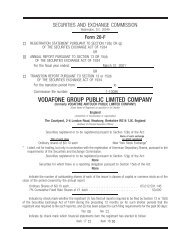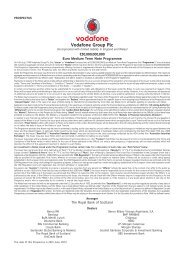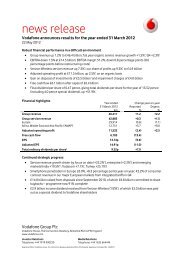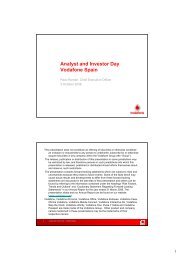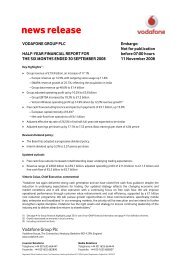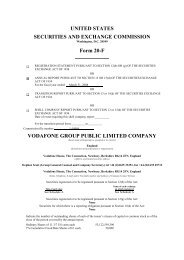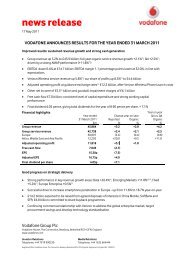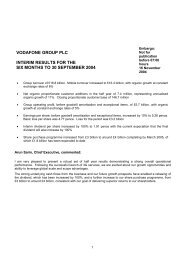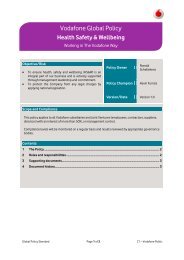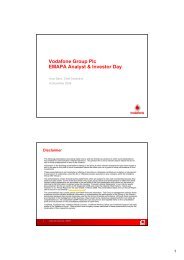Create successful ePaper yourself
Turn your PDF publications into a flip-book with our unique Google optimized e-Paper software.
<strong>Vodafone</strong> – Additional Information<br />
Regulation<br />
The Group’s operating companies are generally subject to regulation governing<br />
<strong>the</strong> operation of <strong>the</strong>ir business activities. Such regulation typically takes <strong>the</strong> form<br />
of industry-specific law and regulation covering telecommunications services and<br />
general competition (anti-trust) law applicable to all activities. Some regulation<br />
implements commitments made by governments under <strong>the</strong> Basic<br />
Telecommunications Accord of <strong>the</strong> World Trade Organisation to facilitate market<br />
entry and establish regulatory frameworks.<br />
The following section describes <strong>the</strong> regulatory framework and <strong>the</strong> key regulatory<br />
developments at <strong>the</strong> global and regional level and in selected countries in which<br />
<strong>the</strong> Group has significant interests. Many of <strong>the</strong> regulatory developments<br />
<strong>report</strong>ed in <strong>the</strong> following section involve ongoing proceedings or consideration of<br />
potential proceedings that have not reached a conclusion. Accordingly, <strong>the</strong> Group<br />
is unable to attach a specific level of financial risk to <strong>the</strong> Group’s performance<br />
from such matters.<br />
World Radiocommunication Conference<br />
During October and November 2007, <strong>the</strong> World Radiocommunication Conference<br />
of <strong>the</strong> International Telecommunications Union met in Geneva to consider<br />
changes to <strong>the</strong> Radio Regulations. The next such Conference will be held in<br />
2011. The Conference establishes, by means of international treaty, <strong>the</strong> basis<br />
upon which radio frequency bands may be used in <strong>the</strong> signatory countries<br />
(which include all markets in which <strong>Vodafone</strong> has interests). Such agreements<br />
are required to prevent interference between users in different countries and<br />
to facilitate <strong>the</strong> development of scalable technologies such as GSM or UMTS.<br />
The most important outcome of <strong>the</strong> 2007 conference for <strong>Vodafone</strong> was <strong>the</strong><br />
identification of additional spectrum in <strong>the</strong> UHF band for mobile services and,<br />
in particular, <strong>the</strong> identification of spectrum in <strong>the</strong> 790-862 MHz range for mobile<br />
services in Europe.<br />
European Union<br />
The EU Regulatory Framework for <strong>the</strong> communications sector (“<strong>the</strong> EU Framework”)<br />
was adopted in 2002 and has been implemented by all EU Member States<br />
although <strong>the</strong>re remain both ongoing and new infringement proceedings against<br />
a number of Member States for late or inadequate implementation.<br />
The EU Framework consists of four principal Directives outlining matters such as:<br />
•<br />
•<br />
•<br />
•<br />
<strong>the</strong> objectives to be pursued by national regulatory authorities (“NRAs”);<br />
<strong>the</strong> way in which telecommunications operators are to be licensed;<br />
measures to be taken to protect consumers; and<br />
ensuring universal provision of certain telecommunications services and <strong>the</strong> terms<br />
and basis upon which operators interconnect and provide access to each o<strong>the</strong>r.<br />
The EU Framework seeks to align <strong>the</strong> techniques for defining where sector<br />
specific regulation may be applied, and <strong>the</strong> threshold for when such regulation<br />
can be applied, with those already employed in EU competition law. It is also<br />
intended to ensure consistency of approach amongst NRAs within <strong>the</strong> Member<br />
States. All NRAs are required to take utmost account of a list of markets which are<br />
specified by <strong>the</strong> European Commission (<strong>the</strong> “Commission”) in a Recommendation<br />
when deciding which markets to investigate. The second such Recommendation<br />
was published by <strong>the</strong> Commission in November 2007 and for <strong>the</strong> mobile industry<br />
includes only <strong>the</strong> market at a wholesale level for ‘voice call termination on<br />
individual mobile networks’. Two markets included <strong>the</strong> first Recommendation,<br />
one for <strong>the</strong> ‘wholesale national market for international roaming’ and <strong>the</strong> market<br />
for ‘access and call origination’ on public mobile networks, have been removed.<br />
NRAs may still review o<strong>the</strong>r markets subject to satisfying certain tests.<br />
Under <strong>the</strong> EU Framework, regulation can only be applied to undertakings with<br />
significant market power (“SMP”), ei<strong>the</strong>r individually or collectively, in <strong>the</strong> relevant<br />
markets, subject to <strong>the</strong> Commission’s consent. SMP under <strong>the</strong> EU Framework<br />
accords with <strong>the</strong> concept of “dominance” under existing EU competition law.<br />
For individual dominance, this generally implies a market share of at least 40%,<br />
although o<strong>the</strong>r factors may also be taken into consideration.<br />
In November 2007, <strong>the</strong> Commission published proposals to amend <strong>the</strong> EU Framework<br />
(“<strong>the</strong> review”). Any changes to <strong>the</strong> EU Framework would become effective following<br />
<strong>the</strong>ir transposition into national law from around 2010. Not all of <strong>the</strong>se affect<br />
<strong>Vodafone</strong> directly. The proposals that may directly affect <strong>Vodafone</strong> include:<br />
•<br />
•<br />
<strong>the</strong> proposed creation of a new European regulatory authority;<br />
<strong>the</strong> extension of <strong>the</strong> Commission’s powers so as to allow it, ra<strong>the</strong>r than national<br />
regulators, to determine remedies where SMP is found;<br />
•<br />
•<br />
•<br />
•<br />
•<br />
•<br />
<strong>the</strong> addition of functional separation as a remedy subject to certain conditions<br />
being fulfilled;<br />
fundamental changes to <strong>the</strong> licensing of spectrum, introducing more flexibility,<br />
trading and market-based approaches;<br />
some ‘net neutrality’ provisions to address <strong>the</strong> concerns that <strong>the</strong> services of some<br />
internet service providers (“ISPs”) will be blocked or o<strong>the</strong>rwise discriminated<br />
against by network operators;<br />
proposals that number portability be completed in one day on all networks in <strong>the</strong> EU;<br />
various measures to address concerns about network security; and<br />
various measures to address <strong>the</strong> provision of services for <strong>the</strong> disabled.<br />
The proposed changes are now being debated in <strong>the</strong> European Parliament and<br />
<strong>the</strong> Council of Member States and this process is expected to continue for most,<br />
if not all, of 2008. The impact of <strong>the</strong> review on <strong>Vodafone</strong> will depend on <strong>the</strong><br />
changes actually adopted by <strong>the</strong> EU, <strong>the</strong> manner in which revised directives are<br />
subsequently implemented in Member States and how <strong>the</strong> revised regulatory<br />
framework is <strong>the</strong>n applied by <strong>the</strong> respective NRAs and <strong>the</strong> Commission.<br />
Spectrum<br />
In February 2007, <strong>the</strong> Commission published a communication on its plans to introduce<br />
greater flexibility in <strong>the</strong> use of spectrum in selected bands, including 2G and 3G bands,<br />
through <strong>the</strong> use of Decisions agreed with <strong>the</strong> Radio Spectrum Committee (an EU level<br />
committee comprising <strong>the</strong> Commission and Member States). These reforms are<br />
expected to take place in advance of <strong>the</strong> review. The first proposed measure is a<br />
replacement of <strong>the</strong> GSM Directive by a decision to allow <strong>the</strong> deployment of UMTS<br />
services using 900 MHz and 1800 MHz spectrum (“refarming”). The Commission<br />
submitted formal proposals for such a decision to <strong>the</strong> European Parliament in July 2007.<br />
In November 2007, <strong>the</strong> European Commission made a policy announcement on<br />
<strong>the</strong> 800 MHz ‘digital dividend’ spectrum (to be released following <strong>the</strong> transition<br />
from analogue to digital TV). It urged Europe, and <strong>the</strong> Member States in particular,<br />
to create new harmonised bands of spectrum for mobile broadband services and<br />
mobile TV. The need for action on <strong>the</strong> digital dividend has been supported by<br />
leading European Parliamentarians, and <strong>the</strong> Member States are expected to respond<br />
with a statement at <strong>the</strong> EU Telecoms Council in June 2008.<br />
International roaming<br />
In June 2007, a regulation (<strong>the</strong> “roaming regulation”) under Article 95 of <strong>the</strong> EU<br />
Treaty came into force requiring mobile operators to offer a ‘euro-tariff’ under<br />
which <strong>the</strong> cost of making calls within <strong>the</strong> EU is capped at 49 eurocents per minute<br />
and <strong>the</strong> cost of receiving calls within <strong>the</strong> EU is capped at 24 eurocents per minute.<br />
Customers who had not o<strong>the</strong>rwise already opted for ano<strong>the</strong>r roaming tariff, such<br />
as <strong>Vodafone</strong> Passport, were automatically opted onto <strong>the</strong> euro-tariff. The roaming<br />
regulation also requires that wholesale roaming charges within <strong>the</strong> EU are capped at<br />
an initial average rate of 30 eurocents per minute and that operators provide certain<br />
tariff transparency services to customers when <strong>the</strong>y roam. The level of <strong>the</strong> retail and<br />
wholesale caps will fall in a fur<strong>the</strong>r 12 and 24 months following <strong>the</strong> application of<br />
<strong>the</strong> regulation, which will terminate after three years.<br />
The Commission is required by <strong>the</strong> roaming regulation to consider whe<strong>the</strong>r voice<br />
roaming should continue to be regulated beyond <strong>the</strong> expiry of <strong>the</strong> current regulation<br />
and, if so, what form such regulation might take. In addition, <strong>the</strong> Commission is required<br />
to review SMS and data roaming and to consider whe<strong>the</strong>r regulation is required,<br />
and if so, what form this might take. The Commission is consulting on <strong>the</strong>se matters,<br />
with a view to publishing conclusions in late summer or early autumn of 2008. The<br />
Commission indicated in February 2008 that it would consider regulation in <strong>the</strong> event<br />
that SMS retail roaming prices did not approach justified levels, which it considered to<br />
be not more than 12 eurocents per SMS. The Commission urged <strong>the</strong> industry to adopt<br />
more predictable and transparent tariffs for data roaming services, and suggested that<br />
wholesale data roaming pricing should fall to around 35 eurocents per megabyte.<br />
Call termination<br />
At 31 March 2008, <strong>the</strong> termination rates effective for <strong>the</strong> Group’s subsidiaries and<br />
joint ventures within <strong>the</strong> European Union, which differs from <strong>the</strong> Group’s Europe<br />
region, ranged from 6.40 eurocents (5.09 pence) to 11.84 eurocents (9.42 pence),<br />
at <strong>the</strong> relevant 31 March 2008 exchange rate.<br />
The Commission is studying <strong>the</strong> regulation of call termination and is expected<br />
to consult upon and <strong>the</strong>n issue a Recommendation in <strong>the</strong> autumn of 2008.<br />
The Commission has indicated that it is concerned by what it considers to be <strong>the</strong><br />
unjustifiably wide range of regulated rates set by NRA’s in <strong>the</strong> EU and by <strong>the</strong>ir level<br />
relative to its view of cost. The NRAs are required to take utmost account of <strong>the</strong><br />
Commission’s recommendations, but may depart from <strong>the</strong>m in justified circumstances.<br />
<strong>Vodafone</strong> Group Plc Annual Report 2008 147




